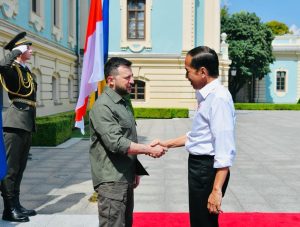Indonesia has just hosted the G-20 Foreign Ministers’ Meeting in Bali. Today, President Joko Widodo’s Indonesia stands strong on the global stage, using its neutral non-aligned status to carefully navigate a diplomatic crisis – in this case the war in Ukraine. The Indonesian leader, known as Jokowi, has met with both U.S. and Russian presidents, as well as fellow G-20 leaders and Ukraine’s president, in order to try and add some cool Javanese diplomacy to the simmering diplomatic tensions between the West and Russia.
Indonesia is also increasingly vocal in combating Chinese expansionism in its backyard, specifically in the South China Sea. Indonesia frequently turns back or in some cases blows up illegal Chinese fishing boats. Indonesia is beginning to assert itself on both the regional and global diplomatic stage – something that many commentators, including myself, have been arguing it should do for almost a decade.
The ascent of Indonesia should be welcomed. As an archipelagic nation, Indonesia is so big and sprawling that it has no interest in expansion but is solely focused on keeping its disparate and stretched territories together. Its neutral status – in which it is allied neither with the West nor China – should also be seen as a positive. By maintaining a neutral stance, Indonesia plays a fine balancing act of attracting both.
Having been fortunate enough to have spent almost my entire career and adult life in Indonesia, I have witnessed first-hand the steady, although admittedly sometimes messy, economic rise of Southeast Asia’s largest economy and ASEAN’s leading power.
Indonesia, growing again after a global COVID-19-induced economic slump, is becoming more developed and advanced every year. It is on the cusp of using its advanced and increasingly strong tech status to move or at least gradually shift the economy from a pure natural resource-based export-orientated economy to a mixed service, manufacturing, and natural resource-based economy and an Asian hub.
Since the time of colonialism and the Dutch East Indies, and before that trading with Indian and Arab merchants, Indonesia has been rich in natural resources and successful at exporting these goods around the world. It will likely and should continue to do so. Awareness of the negative impacts of climate change is increasingly growing in policy circles in Indonesia and with the public at large, with Indonesia making greenhouse gas reduction pledges, but natural resources such as palm oil, love it or loathe it, form the base on which Indonesia is able to develop other strands of the economy.
With the right economic management, and a leader who can strike the right balance between climate change reduction and natural resource development while nurturing Indonesia as a regional manufacturing, service and tech hub, there is no reason why Indonesia will not meet its potential after Jokowi’s second term comes to an end in 2024. With its economic ascent it will be able to increase its political weight on the global stage further – something which Jokowi has started with aplomb.
All this would not be possible without a very aspirational and demographically young and growing Indonesian population. It is unique and striking that Indonesians seem to possess an innate entrepreneurial ability, from the humble street shop or roadside restaurant to Indonesia’s rapidly expanding multibillion dollar tech scene. Years of painfully slow incremental improvements in education, healthcare, and social security programs now finally seem to be showing results.
Indonesia of course remains beset by economic problems outlined in multiple World Bank reports – namely, deep-seated corruption at all levels of business, regulation, and government – and a still largely closed nationalistic economy that both favors local investors and makes it unnecessarily difficult for foreign backers to get even the basic permits to operate. However, the country’s progress and improvement should be celebrated. Indonesia has come a long way over the last five years, let alone the last decade. With the right will and leadership, matched with sound policymaking and financial management, there is no reason why Indonesia cannot accelerate its economic ascent further over the next decade and claim a coveted place at Asia’s top table of superpowers.

































